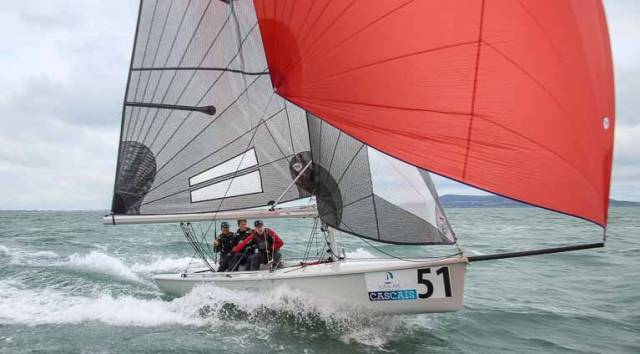Here in the Sailing on Saturday verbiage production complex in a hidden bunker under a nameless hill off an un-named coast of Ireland, all this maundering-on about a gloomy future for sailing in general and Irish sailing, in particular, passes us by completely. For we’re too busy dealing - with only moderate success - with a hyper-busy and continuous throughput of interesting and usually good news about sailing things that interest us, and achievements by sailors that we admire.
Thus of late, our attention has been particularly piqued by Guy and Jackie Kilroy’s restoration of the 1896 classic cutter Marguerite which they successfully commissioned from the multi-talented Larry Archer. And as we write this, it’s all over the sailing news that the equally multi-talented Laura Dillon has just won a race in the Classics Division of the 190-strong International Dragon fleet (190 boats still as keen as mustard to a 1929 design - what can one say?) in the 90th Anniversary Regatta in San Remo, and all that just a few days after she came third overall in the British Open J/70 Championship.
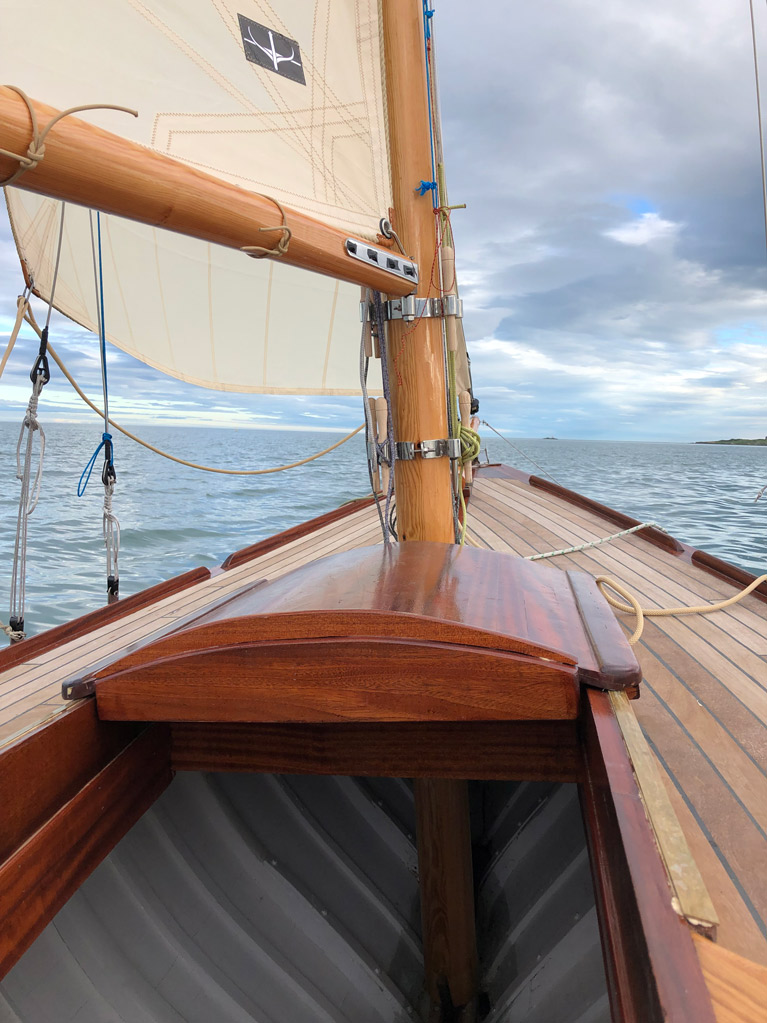 The latest addition to Dun Laoghaire’s growing classic boat flotilla - aboard the restored 1896-built Marguerite (Guy & Jacky Kilroy) in Dublin Bay in September. Photo: Ian Malcolm
The latest addition to Dun Laoghaire’s growing classic boat flotilla - aboard the restored 1896-built Marguerite (Guy & Jacky Kilroy) in Dublin Bay in September. Photo: Ian Malcolm
Laura Dillon is, of course, the only woman who has ever won the All-Ireland Helmsmans Championship which - when she did it in 1996 - was hailed as a great leap forward, the breaking of the glass gender ceiling at the top of our sport. Yet she remains the only woman sailor to have done it.
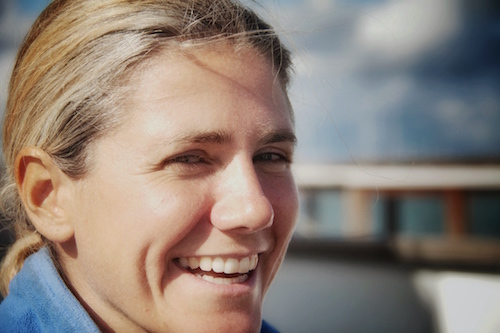 Top helm Laura Dillon, still the only woman to have won the All-Ireland Sailing Championship.
Top helm Laura Dillon, still the only woman to have won the All-Ireland Sailing Championship.
So how do we get more women up there too? For only she and Annalise Murphy have remained at the top of our sport for a long and consistent time. The simple answer is find another Laura Dillon, for she is that rare thing, a true sailing polymath. Like Harry Cudmore in his prime, she can step aboard any boat and make it go faster. And maybe most importantly of all, she conveys a sense of enjoyment and interest which says everything about the popular potential of sailing without having to bellow it from the rooftops. But she does it as a sailor first, so much so that the fact that she’s a woman doesn’t really enter the discussion.
That said, getting more women involved as sailors rather than sailor-supporters is an area which needs exploration, for our national body Irish Sailing has to recognise that, in some areas, participation numbers are dropping. And throughout the country, you’ll always find somebody in some club who is wondering about whether or not the established model of the Irish yacht and sailing club is truly relevant any more.
Irish sailing was booming to such a lunatic extent during the growth towards the Celtic Tiger years that at one stage we were fielding three different three-boat teams for the biennial Commodores Cup series in the Solent, billed as the World Championship of offshore racing. Not only were we fielding thee different teams, but it was such a crazy time that wearing the green jersey was meaningless – the Irish teams were racing against each other with even more determination than they were racing against the teams of other nations. And to top it all out, Ger O’Rourke of Kilrush then became overall winner of the 2007 Rolex Fastnet Race with his Cookson 50 Chieftain, undoubtedly the highest of the high points.
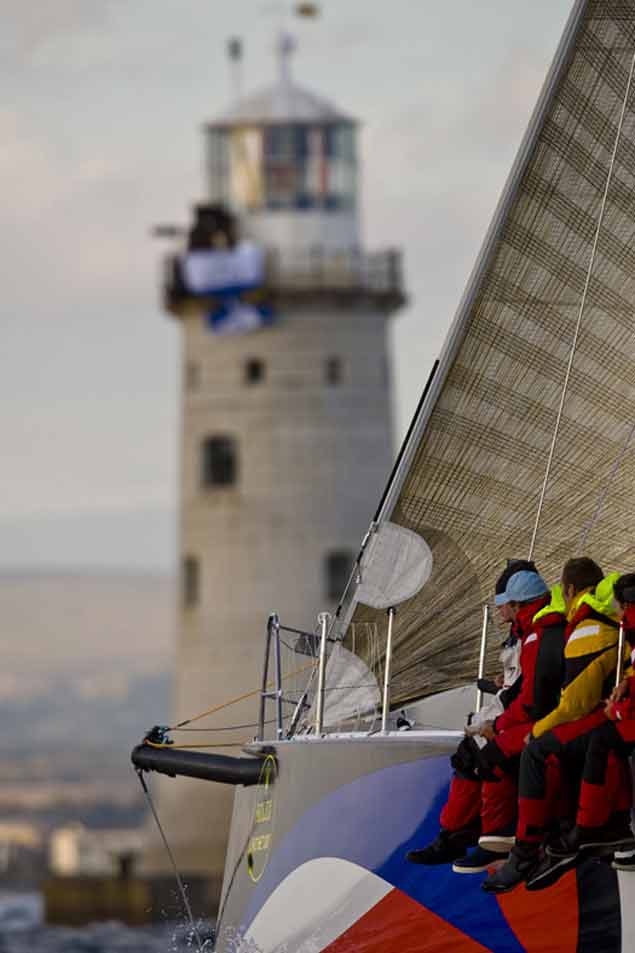 The high point of the boom years of sailing – Ger O’Rourke’s Cookson 50 Chieftain crosses the finish line at Plymouth to become overall winner of the Rolex Fastnet Race 2007. Photo: Rolex
The high point of the boom years of sailing – Ger O’Rourke’s Cookson 50 Chieftain crosses the finish line at Plymouth to become overall winner of the Rolex Fastnet Race 2007. Photo: Rolex
It all ended in tears not because of a clash of loyalties among our Commodore’s Cup teams, but because the national economy fell off a cliff in 2008. It took time for this to become evident in some areas of activity, but in the world of high-end privately-funded offshore racing, the effect was almost instantaneous. Top boats and top owners simply disappeared like snow off a ditch.
In time – jig time in some cases - it spread steadily down through every aspect of sailing until the National Authority - the Irish Sailing Association as it then was - had to implement a ruthless cost-cutting scheme in many of its activities, followed by the 2014 introduction of a five year plan based on a Strategic Review to keep the Association in good health. As for the clubs - which had been thriving in an almost dangerous fashion - they’d to make their own arrangements for survival. And though there were some very close squeaks, by and large we still have the same clubs, and indeed some new ones, as we had in 2008.
Meanwhile the Irish Sailing Association re-branded itself as Irish Sailing, and as CEO Harry Hermon has put it, the 2014 Five Year Plan was basically about putting in place and maintaining the essential pillars of the national sailing administration.
This has been largely successful, but it has been happening in a rapidly changing leisure environment which challenges one interpretation of Irish Sailing’s slogan of “Sailing - a Sport for Life”. Many people now approach their leisure interests on a sort of Tasting Menu basis, trying one thing one weekend and another the next. Claiming something is a sport for life is not necessarily a winning USP. And under-pinning it all these days is a very strong emphasis of doing it in a family-together way.
This is blush-making for those of us in the old school of sailing, who used to bid farewell to the wife and kids every Friday or even earlier, either with dinghy in tow down the road, or aboard an offshore racer, with every intention of being absent and totally boat-absorbed until Sunday evening or Monday morning.
That has all changed. Dare one say it, but to some extent maybe we can “blame” it on the availability of divorce, of which in Ireland – let it be said – we are still mercilessly unenthusiastic. Yet not so many years ago, many of us can remember completely estranged couples who led parallel lives within the same household, but the weekend escape in different directions - whether it be for golf or sailing or whatever – was the only thing which kept the situation tolerable.
In those days, the expression “Fun for All the Family” was considered something of a quaint joke, but nowadays it’s an essential first requirement for any leisure activity which wants to expand its base – or even maintain its position – in an increasingly challenging market.
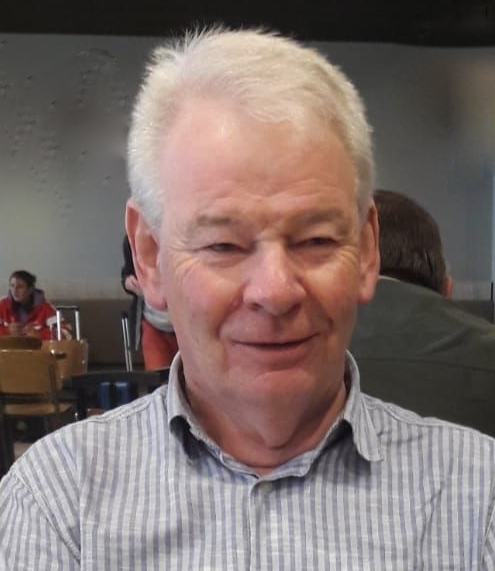 David O’Brien, Admiral of the Royal Cork YC from 2002-2004, is chairing Irish Sailing’s Steering Committee for the Strategic Review to create the Five Year Plan for 2020-2025.
David O’Brien, Admiral of the Royal Cork YC from 2002-2004, is chairing Irish Sailing’s Steering Committee for the Strategic Review to create the Five Year Plan for 2020-2025.
So for the month of October, Irish Sailing has been convening research groups – open to all - at key locations throughout the country, guided by a Steering Committee chaired by former RCYC Admiral David O’Brien, with Harry Hermon as convenor and the members including Fiona Bolger of Baltimore SC, former Howth Yacht Club Commodore Brian Turvey, and PR guru and sailor Sarah O’Connor. Their mission is to find out how our sport really is doing at the grassroots, and where it might go, with professional guidance from sports administration consultants Sarah O’Shea and Lisa Clancy.
The sessions have been in Cork, Clare, Mayo, Greystones and Howth, on a two-hour schedule with focus groups dealing with specific areas on four topics apiece, concluding with a synthesis. You might well think two hours is a very long time for a distinctly Autumnal night, but we could have comfortably used another hour, and the ideas and information flowed thick and fast in the Howth assembly this week, which was attended by no less than nine different clubs – not just the local ones in the Greater Dublin area, but folk from Dunmore East in Waterford and Mullaghmore in Sligo too.
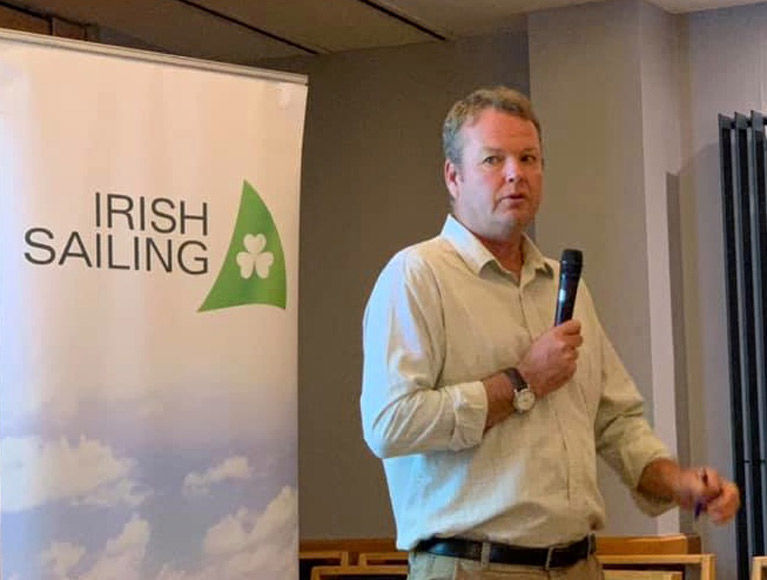 Harry Hermon, CEO of Irish sailing, speaking at this week’s meeting in Howth. Photo: Brian Turvey
Harry Hermon, CEO of Irish sailing, speaking at this week’s meeting in Howth. Photo: Brian Turvey
In an era when club ownership of boats is increasing in order to broaden the overall appeal of the club “product”, the basic and often brutal cost of boat ownership naturally loomed large. At our table, Richard Colwell, Commodore of ICRA, quipped that: “Everyone wants to be a boat owner on Wednesday night, but then be clear of it again until the next race on Saturday”. That just about sums it up, but of course the problem is that when a club has a varied fleet available for charter – the Royal St George, for instance, now owns upwards of 60 boats, they’re mostly small ones but they’ve J/80s and 1720s and a cruiser-racer donated by a former Commodore too – the imminent arrival of good weather can see a rush to take out bookings.
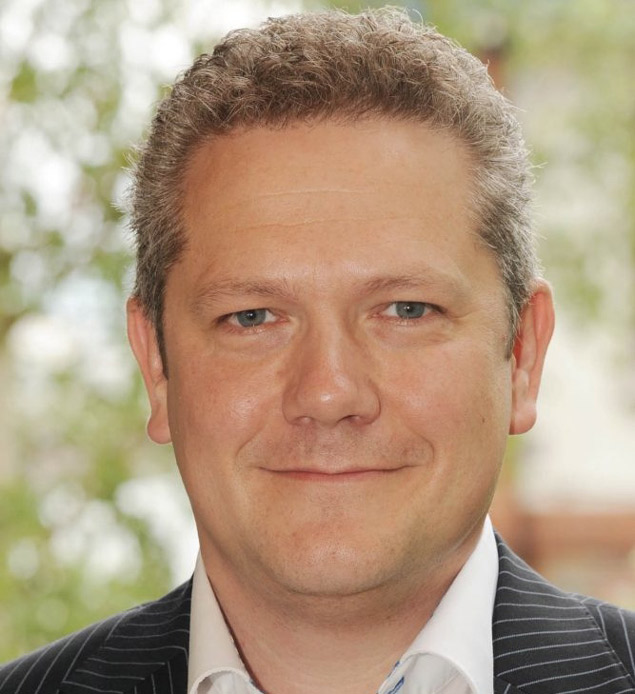 Richard Colwell, Commodore of the Irish Cruiser-Racing Association, commented this week that everybody wants to be a boat-owner when a race is on - it’s the in-between periods which are difficult……
Richard Colwell, Commodore of the Irish Cruiser-Racing Association, commented this week that everybody wants to be a boat-owner when a race is on - it’s the in-between periods which are difficult……
And then of course, no matter who owns the boats, there’s always maintenance and winter storage. The reality is that in Dublin in particular, the marine industry infrastructure bears no proper relationship to the demands which can arise when, for instance, a World Championship is being staged, while the total lack of shed space anywhere near the waterfront means that the Royal St George YC keep their flotillla of J/80s in the winter in the corner of a warehouse in Edenderry. For those who don’t know the Irish Midlands, Edenderry is about halfway to Athlone, and a lot longer when you add in the inevitable M50 congestion.
All these problems relate to sailing being a vehicle sport, and don’t even begin to address the way it is perceived as an activity, and how accessible or interesting it is to the general public. The brutal fact of the matter is that unless somebody has been drowned or an Olympic medal has been won, sailing scarcely registers on the public or government radar at all, and one nugget of useful thinking which emerged from our session is that it is up to sailing to look after itself, and not expect the authorities – whomsoever they may be – to provide the necessary vision from above.
Thus when the old chestnut about sailing being officially on the school curriculum in France came up, and why can’t we hope for that in Ireland, it was pointed out that in many places in Ireland it is happening already, without any fancy directorate being handed down by the Mandarins of the Department of Education. The local schools and sailing club just get together and get on with it, but because it involves ordinary healthy active schoolchildren taking part in a sport which they find interesting and in which they cause no trouble to anyone else, it’s Good News and therefore Not Really News At All.
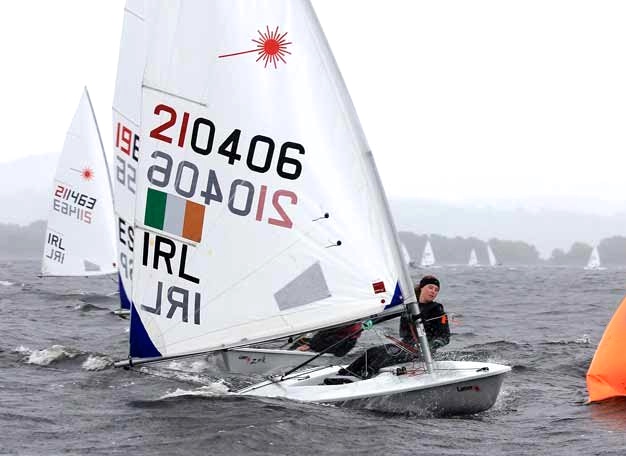 Laser Radial champion Aisling Keller leading the fleet at Dromineer, where she was introduced to sailing thanks to a locally-organised link-up between her school in Nenagh and Lough Derg YC.
Laser Radial champion Aisling Keller leading the fleet at Dromineer, where she was introduced to sailing thanks to a locally-organised link-up between her school in Nenagh and Lough Derg YC.
This, in turn, led to a useful exchange about how helpful it can be when clubs interact directly with each other, not just through the long-established Reciprocal Membership schemes, but in getting on with it, and organizing events up to international level. Thus the successful Galway Bay Sailing Club Cruise-in-Company to Lorient in Brittany in July was organised directly between GBSC and the Yacht Club de Lorient, which sent participating boats to Galway to cruise back with the Irish contingent. Apart from a bit of communication help from the French consul in Galway, it was all done directly inter-club, thereby minimizing the layers of bureaucracy, and it succeeded through a very welcome lightness of touch and mutual goodwill.
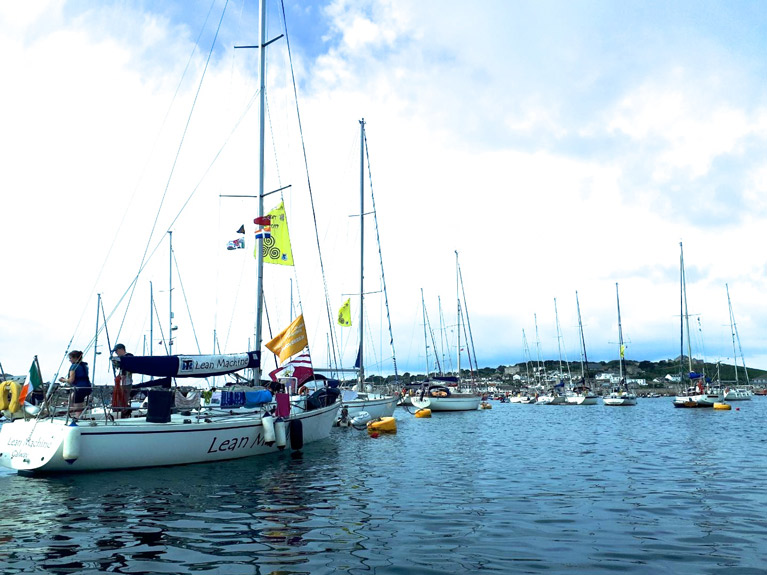 The Galway Bay SC fleet in Hughtown in the Isles of Scilly during their Cruise-in-Company to Lorient in Brittany in July, which was organized directly as an international inter-club event involving GBSC and Yacht Club de Lorient
The Galway Bay SC fleet in Hughtown in the Isles of Scilly during their Cruise-in-Company to Lorient in Brittany in July, which was organized directly as an international inter-club event involving GBSC and Yacht Club de Lorient
Thus if clubs are concerned for their own future, they need to become self-reliant and interact dynamically with their local community. But the official authorities in that local community have in their turn to realize that the bricks-and-mortar establishments which are traditional yacht and sailing clubs are operating in a very changed and challenging environment from the situation when they were built. They have to become much more commercial in their approach to promoting sailing on a businesslike basis – an approach strongly advocated by HYC Commodore Ian Byrne - and the existing planning laws may no longer be relevant to the reality of sailing and club life in the 2020s and beyond.
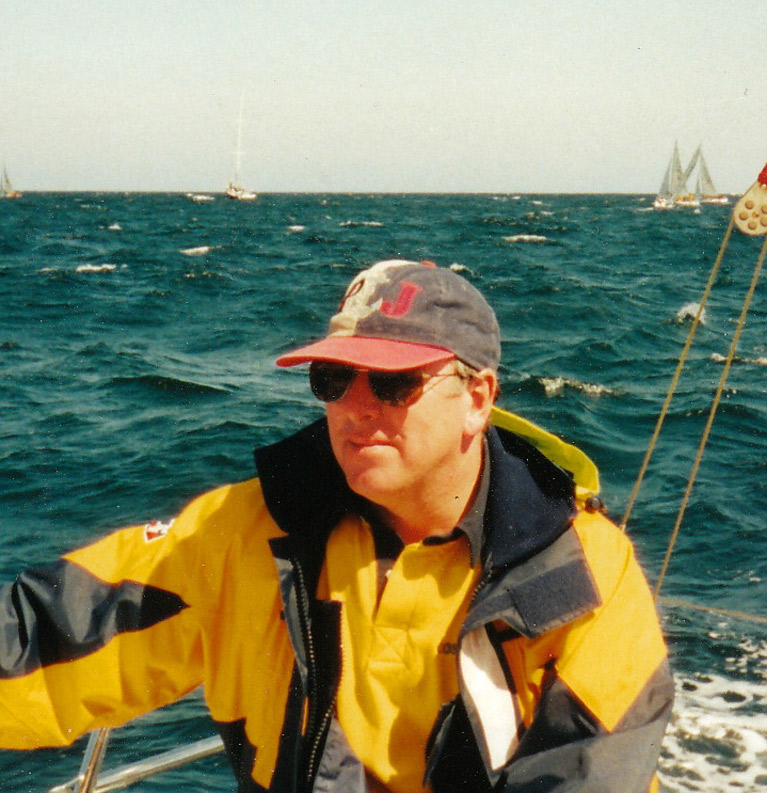 Ian Byrne, Commodore of Howth YC, racing his Sunfast 3200 Sunburn, while he also has a part share in a 112-year-old Howth Seventeen. He is firmly of the opinion that in today’s recreational climate, Ireland’s yacht clubs have to be more commercial in their approach to the many services they provide.
Ian Byrne, Commodore of Howth YC, racing his Sunfast 3200 Sunburn, while he also has a part share in a 112-year-old Howth Seventeen. He is firmly of the opinion that in today’s recreational climate, Ireland’s yacht clubs have to be more commercial in their approach to the many services they provide.
Just how much consideration all this receives from the new Irish Sailing Five Year Plan we’ll learn at the organisation’s AGM next March, when the outcome of this latest Strategic Review will be unveiled. Certainly, something we hope will receive due acknowledgement is the key role played by Ireland’s remarkable class associations. It mustn’t be allowed to pass notice that at last weekend’s All-Ireland Helmsman’s Championship, the winner – Michael O’Connor – came from the strong SB20 Association which also provided last year’s winner, Peter Kennedy, while third-placed was Shane McCarthy of the GP14s, whose Irish class association is so strong it’s a force of nature.
Clearly, there are many factors involved in what might be done to add to sailing’s appeal, while retaining what is already very good. Irish Sailing are looking for thoughtful input into our sailing future, and you can oblige them here




























